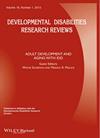Sharon J. Krinsky-McHale, Wayne Silverman
{"title":"Dementia and mild cognitive impairment in adults with intellectual disability: Issues of diagnosis","authors":"Sharon J. Krinsky-McHale, Wayne Silverman","doi":"10.1002/ddrr.1126","DOIUrl":null,"url":null,"abstract":"<p>Individuals with intellectual disability (ID) are now living longer with the majority of individuals reaching middle and even “old age.” As a consequence of this extended longevity they are vulnerable to the same age-associated health problems as elderly adults in the general population without ID. This includes dementia, a general term referring to a variety of diseases and conditions causing substantial loss of cognitive ability and functional declines; adults with Down syndrome are at especially high risk. A great deal of recent effort has focused on the very earliest detectable indicators of decline (and even prodromal stages of dementia-causing diseases). A condition called mild cognitive impairment (MCI) has been conceptually defined as a decline in functioning that is more severe than expected with typical brain aging but not severe enough to meet criteria for a diagnosis of dementia. Consensus criteria for both dementia and MCI have been developed for typically developing adults but are of limited applicability for adults with ID, given their pre-existing cognitive impairments. Early diagnosis will continue to be of growing importance, both to support symptomatic treatment and to prevent irreversible neuropathology when interventions are developed to slow or halt the progression of underlying disease. While the intellectual and developmental disabilities field has for some time recognized the need to develop best-practices for the diagnosis of MCI and dementia, there remains a pressing need for empirically based assessment methods and classification criteria. © 2013 Wiley Periodicals, Inc. Dev Disabil Res Rev 2013;18:31–42.</p>","PeriodicalId":55176,"journal":{"name":"Developmental Disabilities Research Reviews","volume":"18 1","pages":"31-42"},"PeriodicalIF":0.0000,"publicationDate":"2013-08-16","publicationTypes":"Journal Article","fieldsOfStudy":null,"isOpenAccess":false,"openAccessPdf":"https://sci-hub-pdf.com/10.1002/ddrr.1126","citationCount":"82","resultStr":null,"platform":"Semanticscholar","paperid":null,"PeriodicalName":"Developmental Disabilities Research Reviews","FirstCategoryId":"1085","ListUrlMain":"https://onlinelibrary.wiley.com/doi/10.1002/ddrr.1126","RegionNum":0,"RegionCategory":null,"ArticlePicture":[],"TitleCN":null,"AbstractTextCN":null,"PMCID":null,"EPubDate":"","PubModel":"","JCR":"","JCRName":"","Score":null,"Total":0}
引用次数: 82
Abstract
Individuals with intellectual disability (ID) are now living longer with the majority of individuals reaching middle and even “old age.” As a consequence of this extended longevity they are vulnerable to the same age-associated health problems as elderly adults in the general population without ID. This includes dementia, a general term referring to a variety of diseases and conditions causing substantial loss of cognitive ability and functional declines; adults with Down syndrome are at especially high risk. A great deal of recent effort has focused on the very earliest detectable indicators of decline (and even prodromal stages of dementia-causing diseases). A condition called mild cognitive impairment (MCI) has been conceptually defined as a decline in functioning that is more severe than expected with typical brain aging but not severe enough to meet criteria for a diagnosis of dementia. Consensus criteria for both dementia and MCI have been developed for typically developing adults but are of limited applicability for adults with ID, given their pre-existing cognitive impairments. Early diagnosis will continue to be of growing importance, both to support symptomatic treatment and to prevent irreversible neuropathology when interventions are developed to slow or halt the progression of underlying disease. While the intellectual and developmental disabilities field has for some time recognized the need to develop best-practices for the diagnosis of MCI and dementia, there remains a pressing need for empirically based assessment methods and classification criteria. © 2013 Wiley Periodicals, Inc. Dev Disabil Res Rev 2013;18:31–42.
智力残疾成人痴呆和轻度认知障碍:诊断问题
智障人士(ID)现在的寿命更长了,大多数人都达到了中年甚至“老年”。由于寿命延长,他们很容易受到与年龄相关的健康问题的影响,就像一般没有身份证的老年人一样。这包括痴呆症,这是一个总称,指的是导致认知能力严重丧失和功能衰退的各种疾病和状况;患有唐氏综合症的成年人风险尤其高。最近的大量工作集中在最早可检测到的衰退指标上(甚至是引起痴呆的疾病的前驱阶段)。一种被称为轻度认知障碍(MCI)的疾病在概念上被定义为一种功能下降,比典型的大脑衰老更严重,但还没有严重到达到痴呆症的诊断标准。痴呆和轻度认知障碍的共识标准已经为正常发育的成年人制定,但对于患有ID的成年人的适用性有限,因为他们已经存在认知障碍。早期诊断将继续变得越来越重要,既可以支持对症治疗,也可以在开发干预措施以减缓或停止潜在疾病的进展时预防不可逆的神经病理学。虽然一段时间以来,智力和发育障碍领域已经认识到需要制定诊断轻度认知障碍和痴呆的最佳做法,但仍然迫切需要基于经验的评估方法和分类标准。©2013 Wiley期刊公司开发与残疾,2013;18:31-42。
本文章由计算机程序翻译,如有差异,请以英文原文为准。

 求助内容:
求助内容: 应助结果提醒方式:
应助结果提醒方式:


